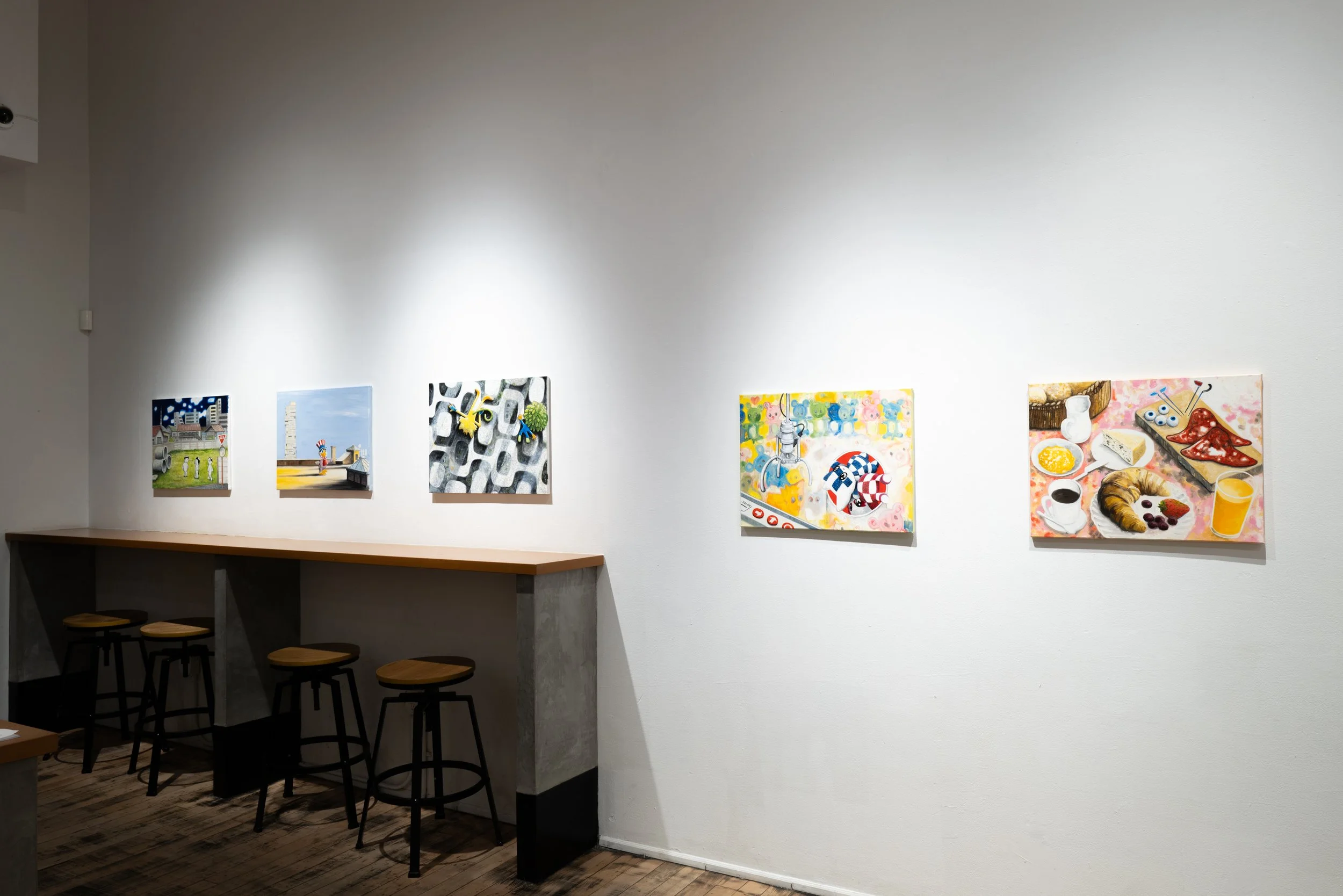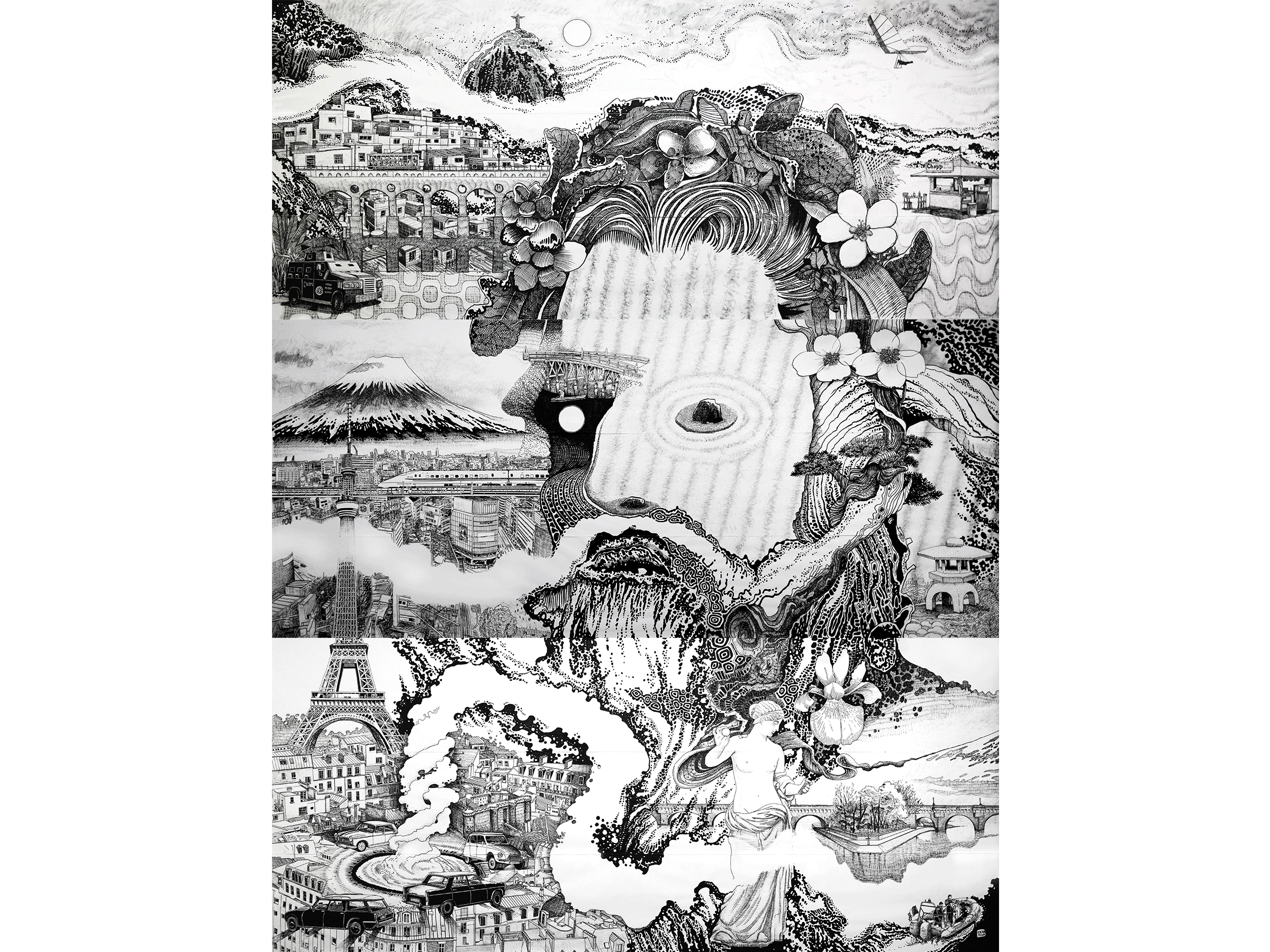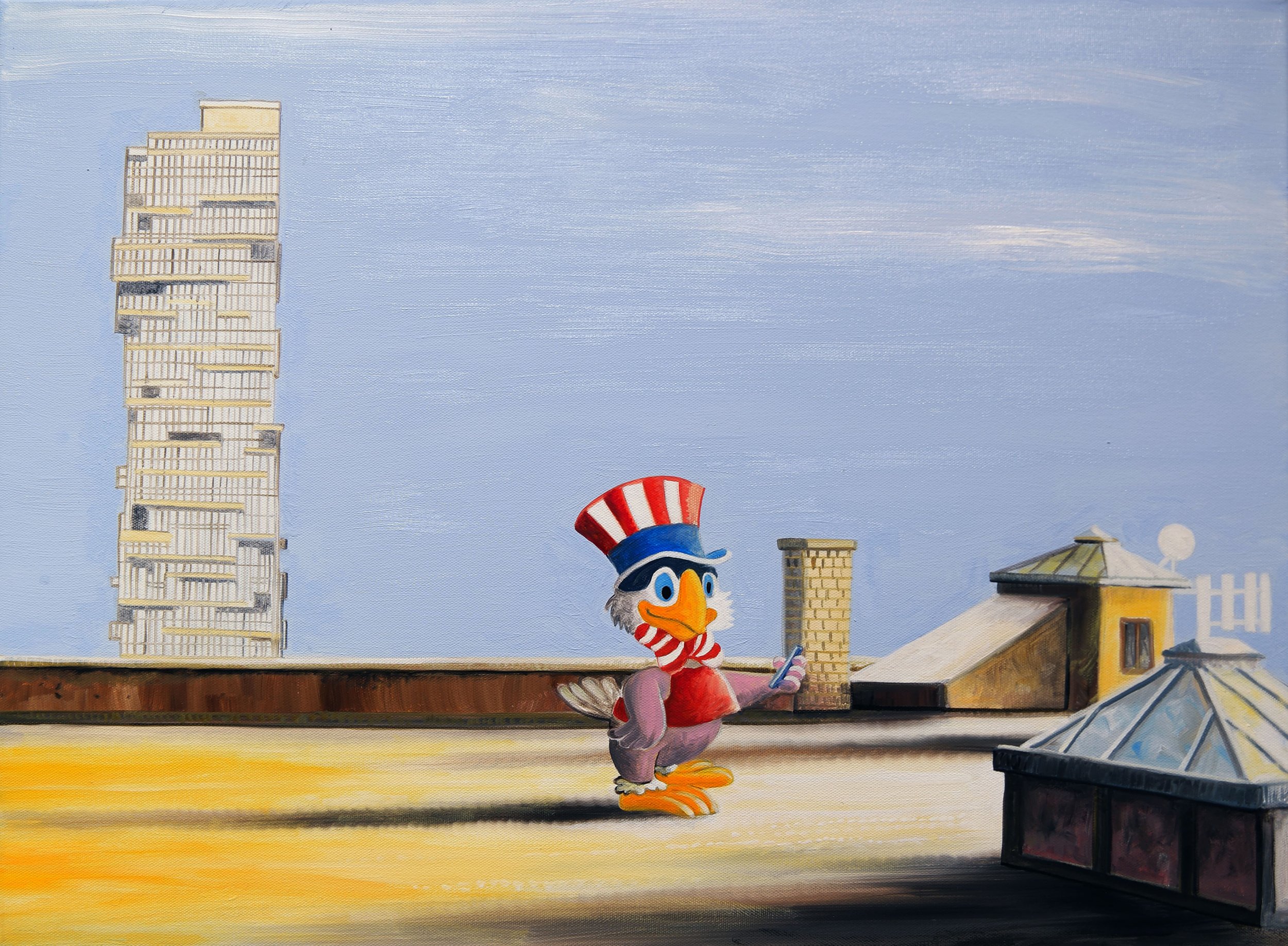TOP | EXHIBITION VIEW | INTERVIEW | ABOUT
HOME > EXHIBITIONS > OSCAR OIWA
Oscar Oiwa
METROPOLIS
June 8 – July 16, 2023
Opening Reception:
Thursday, June 8, 6-8pm
Click here for RSVP
Zeus in New York
The artist Oscar Oiwa has special attachments to numerous cities. These places—Rio de Janeiro, Tokyo, Paris, and New York, deeply inform his art and the logic behind it. In this exhibition’s large-scale piece Zeus, for example, we see three of these cities writ large by Oiwa. These fantastical versions of each place are rendered, in marker, in hyper-realistic fashion. The proximity between the real and the unreal is the life of the piece, and it reflects the experience of intimately knowing a favorite city, where memory, reality, dream, and geography all collide.
The Olympic games, with their connections to both the ancient and the contemporary worlds, were a catalyst for Zeus. The games take over a city, present it to the world, recontextualize it, and compel its citizens to reevaluate their hometown. The modern Olympic Games are hosted in various cities around the world, including Rio de Janeiro in 2016, Paris in 1900 and 1924, and Tokyo in 1964 and 2021. Although New York City has never hosted the summer Olympic Games, it has made bids in the past, reflecting the global appeal and significance of these monumental events.
For Oiwa, the Olympics have both positive and negative impacts on their host cities. As he puts it: “The impact of major sporting events like the Olympics on big cities is far-reaching. They bring about infrastructure development, economic growth, international exposure, and social-cultural impacts, leaving a lasting legacy. However, they also pose challenges such as high costs, environmental impact, and social issues that require effective management and careful navigation.”
Elsewhere in this exhibition we are greeted with the avatars of a modern pantheon—various Olympics mascots from the past. These playful, temporary icons, omnipresent during the life of the Olympic years each of them represent, fade from the collective memory once the games have ended. In Oiwa’s work, they are resurrected and reconfigured; made abject and absurd.
Gods and mascots. In a show that evokes both Zeus, the thunderbolt-wielding patriarch of the fearsome Greek Olympians, and Sam the Olympic Eagle, the cheery representative of the 1984 Summer Olympics in Los Angeles, Oiwa levels the importance of the two. We might wonder whether any similarities might exist between them. Is a god merely a form of mascot? Might mascots find themselves elevated to the position of gods? In the art of Oscar Oiwa, anything seems possible.
Zeus, the god of Olympia (2019)
118" x 264" each piece
marker pen and charcoal on paper
18" x 24"
oil on canvas
Sun in New York (2023)
18" x 24"
oil on canvas
Hangover Tom and Vinicios (2019)
EXHIBITION VIEW










INTERVIEW
LIVING CONNECTED
– An interview with Oscar Oiwa
How is the process different for you between working on the very large-scale drawings and the more traditionally sized paintings?
I do a lot of oil paintings, but I am not exactly a painter. I am a visual creator who chooses many different ways to express myself visually. I have done a lot of drawings on a small scale or a large scale, like the work Zeus. I have also done a lot of oil paintings—both small and very big pieces. At the same time, I have a production of prints, objects, installations, and sculptures for public areas. Recently, I have made some works using digital media.
It’s interesting to see you reference Zeus when talking about this exhibition. Have you always been interested in Greek mythology?
I am not exactly a fan of Greek mythology. What happened was when the Japan Foundation invited me to do an exhibition related to the Olympics at Maison de la Culture du Japon in Paris (because Tokyo will host the games after one year). It was very hard to decide what I could do.
The Olympics is a dauntingly broad topic, and very controlled by its stewards.
And everything related to the Olympics, like the logo mark or event images or even the word "Olympics," has strict reserved rights. Of course, we cannot use individual athletic images or iconic photos based on third parties. So, my solution was to use the mythological images related to Olympus and cityscape images related to the Olympic host cities.
A smart solution. What is your favorite Olympic sport and why?
In my adult life, the quality of big-event broadcasting has become better and better. It's amazing to see games on a big 4K screen with a Dolby stereo sound system. But, on the other side, it has become more difficult to see big games like the Olympics, the FIFA World Cup, or big concerts because everything requires a subscription and needs to be paid for.
What’s an example of this that you can think of?
Well, for example, in news broadcasting, they don't show moving images. So, the public, in general, doesn't have memories of the events. It's contradictory; in the past, image quality was so bad, but everyone was watching TV. These days, the quality is amazing, but I guess fewer people watch the games. So, I am part of the lazy population that doesn't subscribe and doesn't watch almost anything for a decade.
It seems that you have a great love for various cities. What is it about city life that appeals to you? Do you prefer it to country life?
In the main work in this exhibition, Zeus, I am portraying three big cities: Rio de Janeiro, Tokyo, and Paris. I am familiar with these cities, and I have many memories of them. I was born and grew up in São Paulo. After graduating from school, I moved to Tokyo and, actually, I am living in New York now. I like the urban life; I like living connected with cities. People sometimes ask me which city is the best to live in. My answer is that New York is the best city to work in because the economy is dynamic.
What are the pluses of Tokyo and Sao Paulo?
It’s easy and less stressful to eat and get sick in Tokyo because the food quality is very good and the health system works well. And simply in terms of having fun, São Paulo is the best!
Would you like to see the Olympics come to New York City? Do you think it would be capable of hosting the Olympics?
New York already has so many things happening all the time. I think it doesn't need to host mega-events. It's a city with an already exceptionally strong image that is enough to attract a lot of tourists and investment without these kinds of mega-events.
ABOUT
Oscar Oiwa
Born in São Paulo, Brazil
Lives and Works in New York City
Oscar Oiwa was born to Japanese immigrants in São Paulo, Brazil in 1965. He received his B.F.A. in 1989 from the School of Architecture and Urbanism at São Paulo University. He first experienced contemporary art during this time in nearby galleries and became an assistant at the São Paulo Art Biennial. Oiwa held his first solo exhibition while he was still in college and thereafter participated in the 21st São Paulo Art Biennial in 1991.
He lived in Tokyo, where he worked at an architectural firm and continued to exhibit his art, from 1991 until 2002. Oiwa has been recognized with Pollock-Krasner Foundation grants, the John Simon Guggenheim Memorial Foundation Fellowship (2001), and by the Asian Cultural Council in 2002. In 2019, he received the Medal of Honor from His Imperial Majesty, the Emperor of Japan.
His works have been shown widely throughout Asia, the United States, South America, and Europe, including numerous solo exhibitions. He has lived and worked in NYC since 2002.
This is his second exhibition at NowHere.






